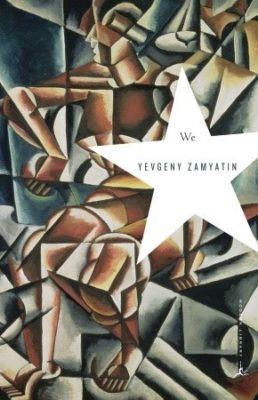This blog post is part of my 2018 challenge ‘moving forward by going back’.

We by Yevgeny Zamyatin
I reread Zamyatin’s We recently. It is, by all intents and purposes, a masterpiece. It was the inspiration or Orwell’s Nineteen Eighty-Four and is undeniably philosophically, morally and politically profound. The more I learn about the time (1921) and place (Russia) in which it was written, the more I am in awe of Zamyatin and his intense bravery for writing such a powerful yet delicate piece of literature.
Although the political and social aspects of the novel are incredibly effective and relevant today, the aspect of the novel that I found to be most impactful was the characterisation, particularly regarding Zamyatin’s depiction of women. Reflecting on the genre as a whole, science fiction is not exactly well-known for its compelling female characters, but Zamyatin really strikes a chord with the rebellious, strong and intensely sexual I-330.
I-330 is a figure of desire for the main character, D-503. In many ways she is seen as an intangible, untouchable fantasy, and as such she possesses all the enigmatic allure that you would expect of such a character, yet she is simultaneously courageous, strong, intelligent and cool-headed. Surprisingly, these traits in no way detract from her femininity or desirability, which is what I would generally expect in a female character – they actually intensify her appeal. D-503 is obsessed with her. Her mysteriousness and aloofness is compelling, but she doesn’t display these qualities in order to make herself attractive to D-503. I-330 is secretive and commanding because she is rebelling against societal constraints, and although she acknowledges her sexual power over D-503, it is not a wholly conscious intention. She is living for herself, for her community, for her ethics, not to win over a man. This sort of delicate balance is rarely seen in fiction, let alone in a science fiction novel.
The dystopian society in We, the One State, maintains a strict atmosphere of facelessness, uniformity and synchronicity for all citizens. In many ways this is freeing for I-330 – looks, achievements and gender do not hold any level of importance and therefore do not affect her behaviour or sense of self. I-330 is not fazed by gender. She is only intimidated by the laws, fears and physical threats that govern the state. The fact that she is a woman within this oppressive society is not a factor to her, which has made me question whether We is a false utopia. Is it a show of extreme equality? If so, is inequality required in today’s society for diversity and social hierarchy?
I don’t believe I have read anything that has ignited these sorts of questions before. The complexity and importance of We has been largely overlooked as a piece of seminal dystopian literature because of Nineteen Eighty-Four, but now that I’ve reread it I believe its impact is far greater and its characters far richer. When I decided to read We for a second time I didn’t expect to get so much from it, but it has altered my perception of the ‘classics’. I think it’s time to delve into my influences influencers.



Leave a Reply